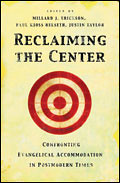I picked up this book just last week and I am already engrossed. I am deeply interested in how the Emergent Church movement is going to develop in the near future, and this book addresses many of what I think are major concerns. It is written on a pretty academic level, so if you decide to flip through it, be prepared to stop and think along the way.
I hope to blog from time to time about the arguments and concerns in the book, and if you have read it (or want to read it) and want to chime in, please do.
First of all, I must admit my personal bias-I don't like postmodern or pragmatist philosophy at all, and I am weary of Christian writers who speak of it too highly. It is one thing to describe our culture as postmodern, and it is another thing altogether to prescribe some form of postmodernism for the church. To be fair, the Emergent movement is not yet a wholesale postmodern movement, but I have seen a lot of leanings in that direction.
Language Games
My first reflection from the book derives from a few of the critiques raised in Groothuis', Moreland's and DeWeese's chapters, and the topic of Smith's chapter. I was surprised to learn how enamored many of the leading Emergent thinkers have become with postmodern language theory. In a nutshell, variants of postmodern language theory attribute the meaning and value of language to a culture and their immediate purposes. We live in a language-constructed reality as a result of our social surroundings, and any meaning or reference language has is a result of what that culture imbeds within it. Language, then, has no real referent to extra-cultural, or metaphysical, reality (at least none that we can get at).
How then is a theology which claims to make assertions about metaphysical, universal reality possible? That is the rub, isn't it? I think is it accurate to say that a postmodern theory of language, as apparently accepted by thinkers like Grenz, Franke, and Nancey Murphy, is incapable of asserting "God exists" in a universal, transcultural way. If these writers are accurate about how language constructs our reality, then we are left in a postmodern haze when it comes to ultimate truth or reality. If you remove the metaphysical referential nature of language, you remove your ability to claim that something is true for all people everywhere and actually mean something. (Notice how subtle a theory of language like this can be-it is not necessarily a denial of metaphysical reality, just our ability to get to it/talk about it.)
I would send the reader to Smith's chapter on language for a much deeper treatment of the issue, but the basic biblical assumption is that theological language is intended to convey metaphysical truths. Scripture intends to convey something like "God exists" in a way that makes it true for all cultures at all times. If we are completely imprisoned by our language, then such an assertion simply cannot apply across the board to all people. That is a serious problem with the growing theological reflection in the Emergent movement.

No comments:
Post a Comment